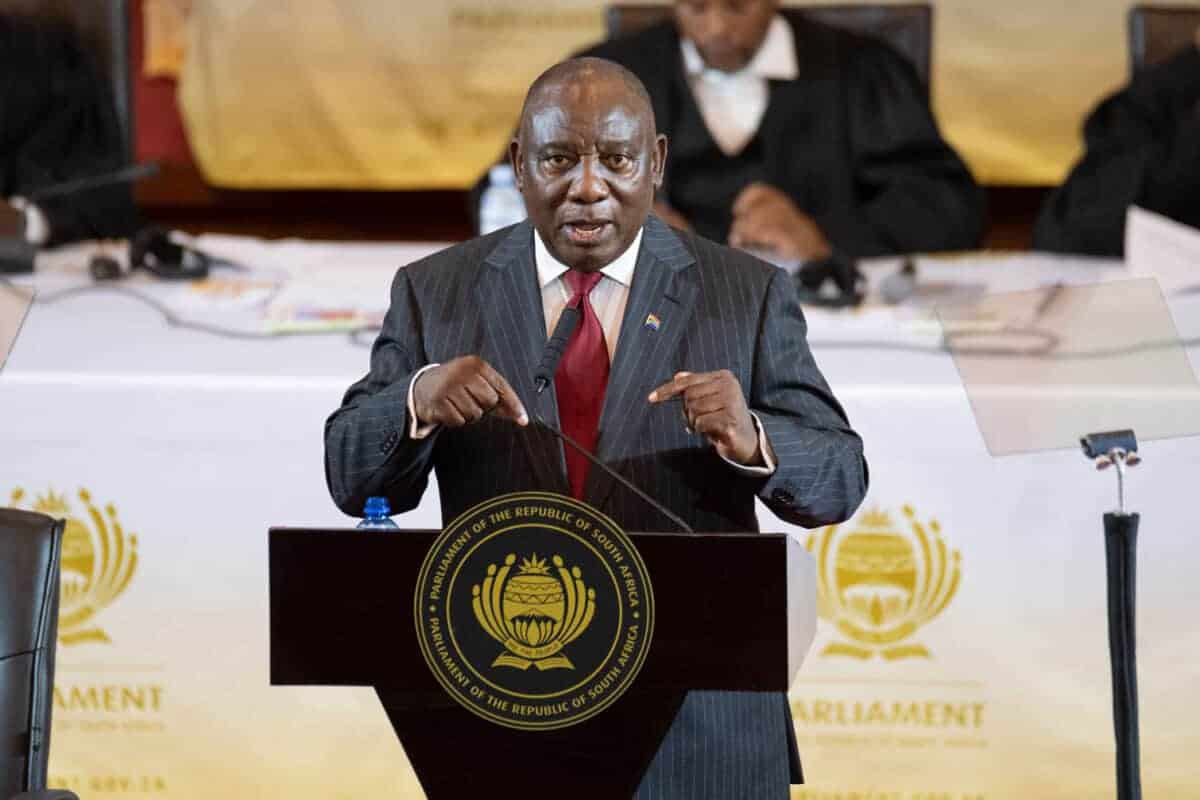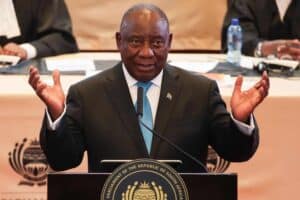President Ramaphosa clarifies brief meeting with alleged fraudster Hangwani Maumela, dismissing claims of close ties amid SIU’s Tembisa Hospital investigation.

President Cyril Ramaphosa has responded to the “brouhaha” surrounding his alleged relationship with Tembisa Hospital corruption-linked Hangwani Maumela, saying they are not closely related and only met briefly.
Images and videos of the president standing outside of Maumela’s Sandton home while engaging in a friendly photo opportunity surfaced on social media.
Last week, the lavish home was raided by the Special Investigating Unit (SIU). Assets were confiscated as part of the SIU’s investigation into the misappropriation of state funds.
Speculation arose about a connection between Ramaphosa and Maumela following their interaction. The SIU revealed that Maumela was the head of a syndicate.
The Maumela syndicate allegedly siphoned almost R900 million from the Tembisa hospital using fraudulent procurement orders.
Ramaphosa denies personal, political connections with Maumela
On Monday, the president’s spokesperson, Vincent Magwenya, explained that the president’s encounter with the alleged fraudster was coincidental.
While on a walk with his then-special advisor, Jomo Sibiya, Ramaphosa paused outside Maumela’s house. He stopped for photos with media personality Tbo Touch (Thabo Molefe) and US pastor Noel Jones outside Maumela’s house, allegedly unaware it was his.
Magwenya stressed that Ramaphosa has no ties to Maumela and dismissed claims linking the president or his former advisor, Bejani Chauke, to Maumela as false.
In a question-and-answer session at the National Council of Provinces (NCOP) on Tuesday, the president clarified his relationship with Maumela. He explained that they are not closely related and have only met briefly.
He confirmed that Maumela is the son of his first wife’s brother. However, the pair had been divorced since 1989.
ALSO READ: Here are the questions Ramaphosa is set to answer on Tuesday
“His aunt, who is my former wife of 47 years ago, is his aunt, and he is really not my relative as such,” the president said.
He then explained another instance where Ramaphosa was walking with his daughter on 26 December 2024.
The president said a young man approached him, introduced himself as Maumela, and explained that his mother wanted to greet him.
During the encounter, Ramaphosa recognised Maumela’s mother as a former schoolmate and a relative of his ex-wife. He said he greeted her briefly at the gate, as she was wearing a gown, and then continued his walk.
The president emphasised that this encounter represented the full extent of their interaction and noted that he often greets people while walking.
‘Do I deal with him? No. Am I appalled? Yes.’
“Do I deal with him? No, do I meet him and sit down with him? No, do I visit him at his house? No. Am I appalled at the allegations that are being made against him? Yes, I am appalled,” Ramaphosa said.
The president was also questioned about his failure to address allegations against Minister of Human Settlements Thembi Simelane.
Simelane was allegedly involved in VBS Mutual Bank looting saga. Ramaphosa was asked if suspending Minister of Police Senzo Mchunu signals a shift in his anti-corruption stance.
He denied having double standards in handling allegations against ministers. He said he carefully evaluates each case.
He explained that he requests reports and makes decisions based on facts, without fear, favour, or prejudice.
The EFF criticised the president for not removing Simelane despite her alleged involvement in corruption.
ALSO READ: President calls for more exports as EU ups investment in SA
Watch President Ramaphosa respond to questions at the NCOP here:
In response, Ramaphosa reiterated that due process must be followed, and decisions are made based on evaluations of reports.
Ramaphosa’s comments from last month about the DA also resurfaced to his detriment.
He had admitted that the best-run municipalities and towns are where the DA governs. He also urged his party’s councillors to follow the DA example.
The president said Cape Town faces challenges such as rapid urbanisation and population shifts. There is also increased pressure on services like housing, water, and sanitation.
Ramaphosa said the legacy of apartheid spatial planning has left many townships and informal settlements in Cape Town far from economic hubs. This has exacerbated service delivery issues.
President accused of backtracking on DA governance comments
He noted that despite performing well in financial governance, Cape Town has not made significant progress in reducing inequality within the metro.
Ramaphosa said census data showed that Cape Town performed worse than the metro average in expanding access to services. This includes water, electricity, refuse removal, and sanitation.
“The national government is committed to working with provincial governments and municipalities to ensure that all our country’s citizens enjoy equal access to quality services,” Ramaphosa said.
DA MP Rikus Badenhorst accused Ramaphosa of backtracking by suggesting that the Auditor-General only audits finances, not service delivery.
In response, Ramaphosa re-emphasised that his views were based on Stats SA census data and budget analyses.
ALSO READ: Ramaphosa hides ANC rot behind the struggle credentials of its leaders
While the city’s finances may look strong, he said, what matters is the real impact on people’s lives.
He added that per capita spending in townships and informal settlements remains significantly lower, reflecting ongoing racial disparities.
“One cannot stand on Table Mountain and say, ‘I am doing better than others. You need to demonstrate that on a per capita basis, you are changing the lives of people. That is what is required,” the president said.
He stressed the need for corrective measures in the metro and emphasised that his critique aimed to improve, not dismiss, Cape Town’s efforts.
He highlighted the importance of all municipalities learning from one another.
Gaza ceasefire welcomed, SA’s ICJ case continues
“And as I say, we need to learn from each other. Yes, we do need to learn from each other,” the president said.
Meanwhile, Ramaphosa has welcomed the recent ceasefire in Gaza and the release of hostages and prisoners as confidence-building steps in the Middle East.
He, however, said that these recent actions do not affect South Africa’s case against Israel at the International Court of Justice, accusing it of violating the Genocide Convention.
Ramaphosa reiterated South Africa’s commitment to justice and the long-term goal of an independent Palestinian state living in peace alongside Israel.
He also emphasised that real justice and self-determination must follow legal and diplomatic processes.
NOW READ: Ramaphosa lauds Mthethwa as ‘unapologetic activist’
Support Local Journalism
Add The Citizen as a Preferred Source on Google and follow us on Google News to see more of our trusted reporting in Google News and Top Stories.






